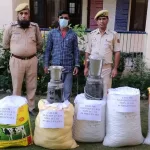Srinagar, the heart of Kashmir, is widely acclaimed for its breathtaking landscapes, including Dal Lake, the Jhelum River, and the surrounding Himalayas, bearing a variety of flora & fauna. However, the rapid pace of urbanization, pollution, deforestation, and climate change seriously threatens its fragile ecosystem. This article explores how community-driven environmental initiatives can play a crucial role in ensuring a sustainable future for Srinagar. By analyzing local efforts in waste management, afforestation, water conservation, and Eco-tourism, we highlight the importance of community participation in addressing environmental challenges.
Kashmir’s ecological balance has been severely disturbed because of unabated environmental destruction over nearly five decades. Permanent snowfall on mountains has receded, average temperatures in the valley have risen, and the amount of rain and snowfall has significantly diminished. The combined effect of deforestation and mismanagement of water resources has resulted in soil erosion, which is responsible for the frequent flash floods now seen in the UT of Jammu and Kashmir. Rainfall and snow have decreased to an alarming level. Over the years, the chilling winter season of the valley, locally called ‘Chilia Kalan’, has changed a lot in the valley.
Currently, Srinagar faces various environmental issues, such as air and water pollution, unregulated waste disposal, and habitat degradation. Srinagar is known as the city of lakes, but now, this heritage is in the very jaws of its extinction. Lakes are especially vulnerable to pollution. Dumping of rubbish, refuse and garbage is done on a significant scale in the waters of the lakes, which in the old days were used even for drinking purposes by their neighbours and the localities around.
At the same time it is noteworthy that the concerned Government administration has taken various initiatives to deal with the environmental maladies of Srinagar. However, Government interventions alone are insufficient to tackle these problems; hence, community-driven initiatives are vital. Active public participation in environmental conservation can foster sustainable development, ensuring long-term ecological balance and socio-economic benefits for residents.
Major Environmental Challenges in Srinagar
- Urban heat island effect: Haphazard urban expansion coupled with an unprecedented increase in population has affected the ecosystem of the city of Srinagar. This is causing large scale transformation of the hitherto vegetated and cultivated land into built-up surfaces, contributing to the rise of an urban heat island effect. The built-up, open, and barren lands in the city of Srinagar are experiencing temperatures of up to 6 °C higher than the prevailing minimum temperature.
- Pollution & Degradation of water bodies: Dal Lake, a symbol of Srinagar’s heritage, is threatened by pollution from untreated sewage, encroachment, and excessive weed growth. The Jhelum River also suffers from industrial and household waste dumping, leading to deteriorating water quality.
- Mismanagement of solid waste: The city generates tons of waste daily, with inadequate waste segregation and disposal facilities. Plastic pollution is a growing concern, affecting both terrestrial and aquatic ecosystems.
- Urban Sprawl: Rapid construction activities, deforestation, and loss of wetlands have reduced green cover, increasing the risk of floods, soil erosion, and loss of biodiversity.
- Air Pollution: Vehicle emissions, brick kilns, and increasing construction activities have contributed to deteriorating air quality, affecting public health and the environment.
Several successful community-driven environmental initiatives worldwide can serve as models for sustainable development in Srinagar. These initiatives focus on waste management, water conservation, afforestation, and eco-tourism, offering valuable lessons for addressing Srinagar’s environmental challenges.
Costa Rica’s Eco-Tourism Model
Costa Rica, officially the Republic of Costa Rica, a country located in Central America has successfully developed a sustainable tourism model that preserves biodiversity, involves local communities, and promotes eco-friendly accommodations.
Application in Srinagar
- Promote ecotourism in Kashmir by supporting local homestays with green certifications.
- Encourage houseboats to adopt solar energy and waste management solutions.
- Develop trekking and heritage tours that support conservation efforts.
OSIENALA or the “Friends of Lake Victoria Movement” (Kenya)
The Republic of Kenya, in East Africa, developed this grassroots movement that focuses on reducing pollution in Lake Victoria by involving local communities in cleanup efforts, sustainable fishing practices, and wetland restoration.
Application in Srinagar
- Organize community-based cleanup drives for Dal Lake and the Jhelum River.
- Encourage sustainable fishing and tourism practices to reduce water pollution.
Waste Warriors, (Uttarakhand, India)
Waste Warriors is a community-driven initiative working in the Himalayan regions to manage waste through education, segregation, and recycling. Volunteers and residents conduct cleanliness drives, raise awareness, and collaborate with local governments for sustainable waste disposal.
Application in Srinagar
- Implement community-led waste segregation programs in households and markets.
- Establish waste collection and recycling hubs near Dal Lake and other tourist areas.
- Engage local youth and NGOs in awareness campaigns to promote zero-waste initiatives.
The Green Belt Movement (Kenya):
Founded by Nobel Laureate Wangari Mathai, this initiative mobilizes local communities, especially women, to plant trees and restore degraded forests.
Application in Srinagar
- Launch a “Green Srinagar” initiative to plant native trees in deforested areas.
- Involve local schools and colleges in tree plantation drives.
- Provide incentives to communities for maintaining and protecting green spaces.
Johad Water Harvesting System (Rajasthan, India)
The Tarun Bharat Sangh (TBS) revived traditional Johad (small earthen dams) water harvesting systems, rejuvenating groundwater levels, and bringing dry rivers back to life.
Application in Srinagar
- Revive traditional water harvesting techniques in rural and urban areas.
- Restore wetlands like Hokersar to improve flood management and biodiversity.
- Implement rainwater harvesting systems in schools and government buildings.
Bye Bye Plastic Bags Campaign (Indonesia)
- Location: Bali, Indonesia
- Concept: Initiated by the local youth and led by two sisters, Melati and Isabel Wijsen, this movement successfully led to a government ban on single-use plastics through advocacy, awareness campaigns, and community engagement.
Application in Srinagar
- Introduce community-led plastic bans in markets and tourist areas.
- Encourage shops and restaurants to switch to biodegradable alternatives.
- Organize workshops and awareness programs on the impact of plastic pollution.
These successful global models demonstrate how community participation can drive environmental sustainability. Srinagar can adopt similar strategies by involving local communities, policymakers, and businesses in efforts to protect its natural resources. By learning from these initiatives, Srinagar can implement sustainable solutions for a cleaner, greener, and more resilient future.
Policy Recommendations
- Strengthening Community Participation – The government should collaborate with local communities, empowering them with resources and training for effective environmental management.
- Public-Private Partnerships – Engaging businesses and NGOs in sustainability projects can provide funding and technical expertise for green initiatives.
- Education and Awareness – Schools, colleges, and community centers should integrate environmental education to build long-term ecological responsibility.
- Technological Innovations – Smart waste management, water purification systems, and eco-friendly infrastructure should be promoted to enhance sustainability.
- Legal and Policy Reforms – Stricter environmental laws and their enforcement, along with incentives for sustainable practices, can further community-driven efforts.
Conclusion
Srinagar’s environmental challenges demand a collective response from communities, policymakers, and civil society. Community-driven environmental initiatives have shown promising results in addressing pollution, waste management, afforestation, and eco-tourism. Strengthening these efforts through better policies, education, and technology will pave the way for a sustainable and resilient Srinagar.
(The Authors are research scholars at the University of Kashmir, Department of Sociology; reachable at: [email protected].)








